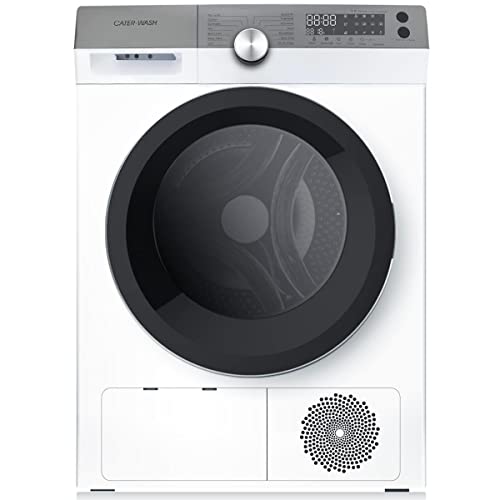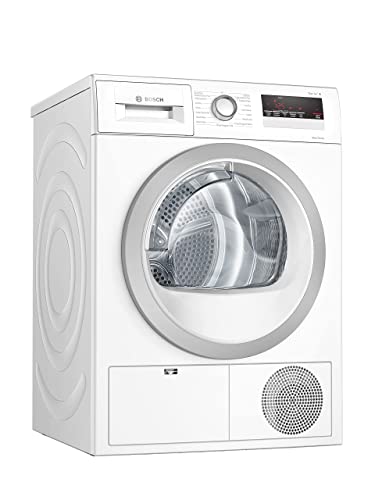20 Things You Need To Be Educated About Tumble Dryers Heat Pump Vs Con…
페이지 정보

본문
 Heat Pump Vs Condenser Tumble Dryers
Heat Pump Vs Condenser Tumble DryersTumble dryers come in a variety of different styles. John Lewis has vented and condenser tumble dryers in store and on the internet, with a team of expert sales advisers on hand to assist you in finding the perfect one for your requirements.
Vented models must be connected to an external vent, whereas condenser units don't, and can be placed wherever you want them within your home. Condenser models get rid of moisture by moving hot air into a separate chamber, and transform it into water which is stored in a container that needs to be emptied regularly.
Heat pump dryers are more efficient.
The tumble dryers with a heat pump are one of the many advancements in the modern laundry industry. These dryers are designed to be efficient and gentle on fabric. These dryers are also more flexible than vented or condenser models in terms of positioning.
The dryers of a heat pump function by capturing warm air and recycling it into dry clothes. They accomplish this by combining the functions of an air conditioner and dryer. This process is extremely efficient in terms of energy consumption and doesn't require venting. This makes them a great option for those looking to save on their electricity bills and be environmentally conscious.
Contrary to conventional dryers traditional dryers utilize a fan to blow hot air across the laundry that is tumbling. The hot air is discharged to the outdoors and replaced with air that is room temperature. The result is that a traditional dryer uses a significant amount of electricity to dry laundry. This can lead to high utility bills over time. Heating pump dryers can cut utility bills by up to 50 percent.
A heat-pump is also more eco-friendly, since it consumes less energy and water than the typical dryer. This is because it doesn't need to use an additional tank to store its coolant like a gas dryer. It recycles the warm, discarded air from the drum of the dryer.
Another benefit of a heat-pump dryer is that it does not require a duct, which can be a major hassle for people who live in tiny houses or have no laundry room. This eliminates the need to clean the duct every six months which is typically required for traditional dryers. This saves time and effort for busy individuals.
A drying system that uses a heat pump could cost more initially than a vented dryer however, it will save you money in the long run due to its low running costs. Peter McPhee, a senior program director at the Massachusetts Clean Energy Center, estimates that his family's heat-pump dryer is saving them hundreds of dollars each year.
Find a heat-pump dryer with sensors that detect when your laundry is finished and stops the cycle. This will help you save money on electricity and also prevent drying too long, which can cause damage to your fabric. Also, you should look for a dryer that has an lint screen as well as condenser coil. These parts should be cleaned regularly in order to ensure maximum performance.
They are quieter
The newest tumble dryers are more quiet than vented models, and especially those with heat pump technology. This is because they circulate warm air inside the laundry, instead of blowing it out. This makes them ideal for use in open plan spaces and smaller homes. They are also more gentle on clothing. However, they may take a bit longer to dry due to lower temperatures.
The primary drawbacks of heat pump dryers is that they cost more to buy than vented tumble-dryers. This can be a major issue for families who are concerned about their budget. Despite this, they save energy in the long run and are much more eco-friendly than other types of tumble dryers. They are also gentler on your clothes, which means they are less likely to pull them off or shrink them. They are also more user-friendly and come with more programs than traditional vented drying machines.
Contrary to vented dryers that require external venting to expel damp air the heat pump models do not require this, making them an ideal choice for homes with a small space or that can't make structural modifications. This is particularly beneficial when you live in an apartment or letting your home. Additionally, they're a good choice for people who are sensitive to humidity and want to avoid mildew or mold.
The heat pump dryer works by extracting vapor from clothes, which later condenses into water. The vapor is then recycled back into the dryer, and because it uses less electricity than conventional tumble dryers, it's a green option. The dryers that use heat pump technology also operate quite quietly, meaning you can rest while your laundry is drying.
While there are some downsides for tumble dryers with heat pumps including their higher upfront cost and their slower drying cycle, they are worth the extra expense in the long run because of their high energy efficiency and gentle fabric care. These attributes make them an ideal option for busy households and there's a variety of models to fit every budget. It is important to consider your usage patterns and the total cost of the ownership (purchase price and running costs) before deciding which type of tumble dryer is the best for you.
They are more flexible
If you're looking for a tumble dryers heat pump vs condenser dryer that is more energy efficient and gentle on your laundry, you should consider a heat pump dryer. These appliances use recycled hot air to dry your clothes, which can save you money in the long run. Apart from being environmentally friendly, these machines can be used in well-ventilated areas without the need for vents outside. They also require less space than vented dryers. However, they can take longer to dry your laundry than a vented dryer.
Traditional vented dryers utilize gas to heat the drum and expel moisture. Although they are less efficient than condenser and heat pump models, they still consume less energy than other dryers. They are also a great choice for homes with limited energy requirements.
Heat pump and condenser models make use of a heat exchanger to convert warm water into air, reducing the energy use by a half. They are quieter than other tumble-dryers, and some models have dampening mechanisms to cut down on noise levels. They can be stacked with a washing machine to save space, and a lot of models are suitable for wall-mounting.
A heat pump tumbler makes use of conventional and solar energy to perform its cycle of washing. It can reduce energy bills by as much as 50% when compared to vented tumble dryers. It can also be combined with an electric heater to further improve efficiency. Heating systems can be expensive if they are used for a large amount of laundry.
While they may cost more upfront than a vented dryer heat pump tumble dryers have lower operating costs and offer more flexibility. They are also simple to use and come with various programs, including anti-crease and ironing functions. They can be used in a variety of rooms and are often suggested for people who live in apartments. They can also be used by people who live in areas with poor air quality, or who want to lower their carbon footprint. The most efficient tumble dryer will depend on the type of laundry you're using, your budget, and tumble Dryers Heat pump vs Condenser the space you have available.
They are more expensive
The name implies that heat pump dryers use an array of heating and cooling technology to dry your clothes. They are more energy efficient than vented tumble dryers, and can help you save money on your electric bills. They are also quieter and are gentler on your clothes. They cost more initially than vented models. The energy savings offset this price difference.
The dryers that use a heat pump utilize a heat exchange system to reuse the heated air. This reduces energy use by up to 15%. They can also save you time and money by detecting the amount of moisture in your laundry and then changing the cycle accordingly. They have a lower impact on the environment than vented tumble-dryers.
The Beko DPHR8PB561W 8Kg Heat Pump Tumble Dryer is a great example of a very efficient and quiet heat pump dryer that is suitable for small to medium sized households. It is A+++ rated and has a large capacity for your normal washing needs. It is also extremely simple to use since it comes with a variety of automated programs that perform the hard work for you. It detects the degree of wetness of your laundry and determines the best drying time for each load. The dryer will inform you when it's finished so you don't have to worry about overdrying your clothing.
Condenser and vented tumble dryers discharge moist air into the laundry room or out via an extraction hose. The tumble dryers with a heat pump do not require an extraction hose because they reuse the heat of the air. They circulate warm moist air, and then put it into a reservoir or funnel it into the drain.
It takes them longer to dry laundry than vented dryers. However, the additional time is worth it due to their energy efficiency and gentle way of drying your laundry. They are better for the environment and cheaper to run over the long term than vented dryers, which are not able to reuse heat and thus require more energy.

- 이전글You'll Never Guess This Bmw Key Replacement Cost's Secrets 24.04.30
- 다음글Who Is Responsible For An Freezer Budget? Twelve Top Ways To Spend Your Money 24.04.30
댓글목록
등록된 댓글이 없습니다.

